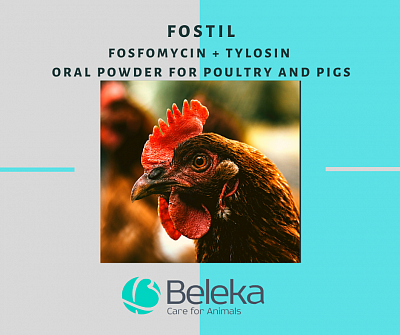Forstil (Fosfomycin + Tylosin tartrate) Oral powder

Fostil powder is a combination of Fosfomycin, Tylosin and Fructose 1,6-bisphosphate, which act synergistically providing an extended spectrum of antibacterial activity and enhances the penetration ability of the medication in the cell of a pathogen.
Oral powder for poultry and pigs
Fosfomycin calcium…………………………… 200 mg.
Tylosin tartrate……………………………....… 50 mg.
Filler: Fructose 1,6-bisphosphate.
Treatment of bacterial diseases caused by organisms sensitive to the active ingredients in poultry and pigs.
- Poultry: mycoplasmosis, colibacillosis, chronic respiratory diseases, salmonellosis, pasteurellosis, listeriosis, staphylococcal infections.
- Pigs: atrophic rhinitis, enzootic pneumonia, pasteurellosis, Actinobacillus pleuropneumoniae, polyserositis associated with Haemophilus spp., colibacillosis, salmonellosis, streptococcal infections, necrotic enteritis, erysipelas, Mastitis-metritis-agalactia syndrome, cystitis, pyelonephritis, bacterial arthritis, dysentery, mycoplasmosis.
Fosfomycin and Tylosin act synergistically providing an extended spectrum of antibacterial activity. The combination of Fosfomycin, Tylosin and Fructose 1,6-bisphosphate enhances the penetration ability of the medication in the cell of a pathogen.
Fosfomycin is a natural bactericidal broad-spectrum antibiotic (derived from phosphonic acid), which acts on proliferating bacteria by inhibiting cell wall and early murein/peptidoglycan synthesis, which gives fosfomycin a number of properties not found in other antibiotics:
- inhibition of bacterial adhesion to epithelial cells
- exopolysaccharide biofilm penetration
- immunomodulatory effect
- phagocytosis promotion
- protection against the nephrotoxicity caused by other drugs
Fosfomycin has chemical characteristics not typically observed in organic phosphoric compounds and its molecular weight is almost the lowest of all the antimicrobials. The low toxicity and potential efficacy of Fosfomycin are the main factors that contribute to its use in animals. Thus, it has been used to treat a broad variety of bacterial infections in humans, such as localized peritonitis, brain abscesses, severe soft tissue infections, cystitis and other conditions. In veterinary medicine, Fosfomycin is used to treat infectious diseases of broiler chickens and pigs. In broilers, it is administered for the treatment of E. coli and Salmonella spp. infections. In piglets, the drug is prescribed to treat a wide variety of bacterial infections. Fosfomycin penetration is demonstrated in phagocytic, respiratory (HEP-2) and intestinal (IPEC-J2) cells.
Fosfomycin range of action:
Gram-positive bacteria: Enterococcus spp., Staphylococcus spp., Streptoсоссus sрр., Listeria monocytogenes.
Gram-negative bacteria: Escherichia coli, Salmonella spp., Citrobacter spp., Klebsiella spp., Proteus spp., Serratia spp.
Tylosin range of action:
Gram-positive bacteria: Escherichia coli, Klebsiella spp., Salmonella spp., Proteus spp., Campylobacter spp., Pseudomonas aeruginosa, Bordetella spp., Pasteurella spp., Haemophilus spp., Actinobacillus spp., Brucella spp. Gram-positive bacteria: Staphylococcus spp., Streptococcus spp., Listeria monocytogenes, Corynebacterium spp., Erysipelothrix rhusiopathiae, Clostridium spp., as well as mycoplasma and chlamydia.
